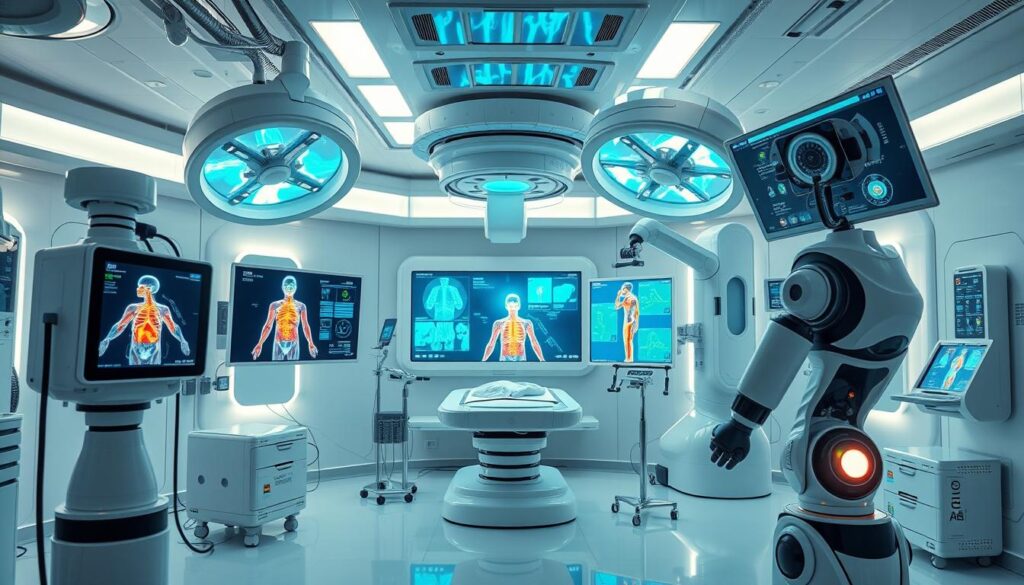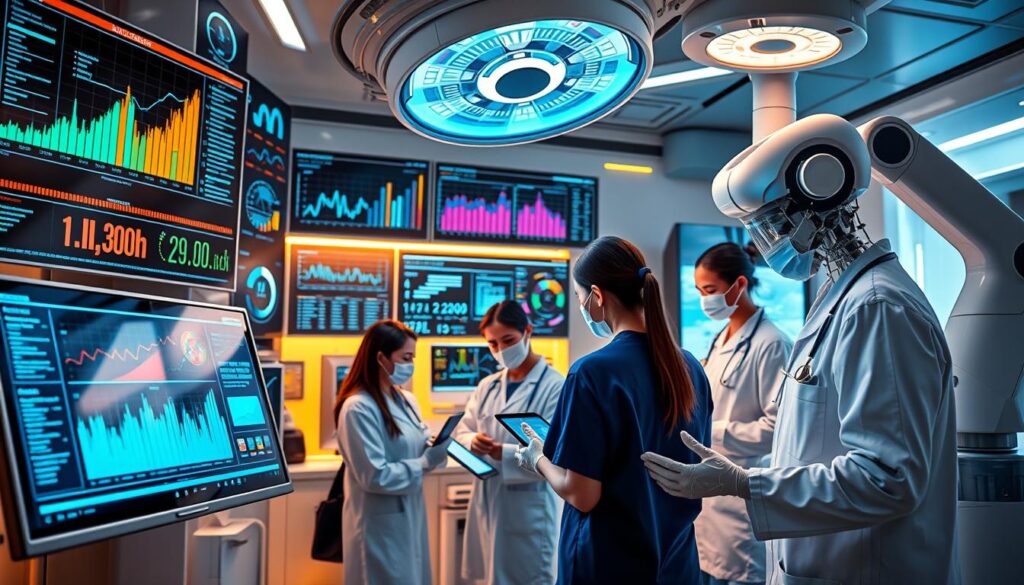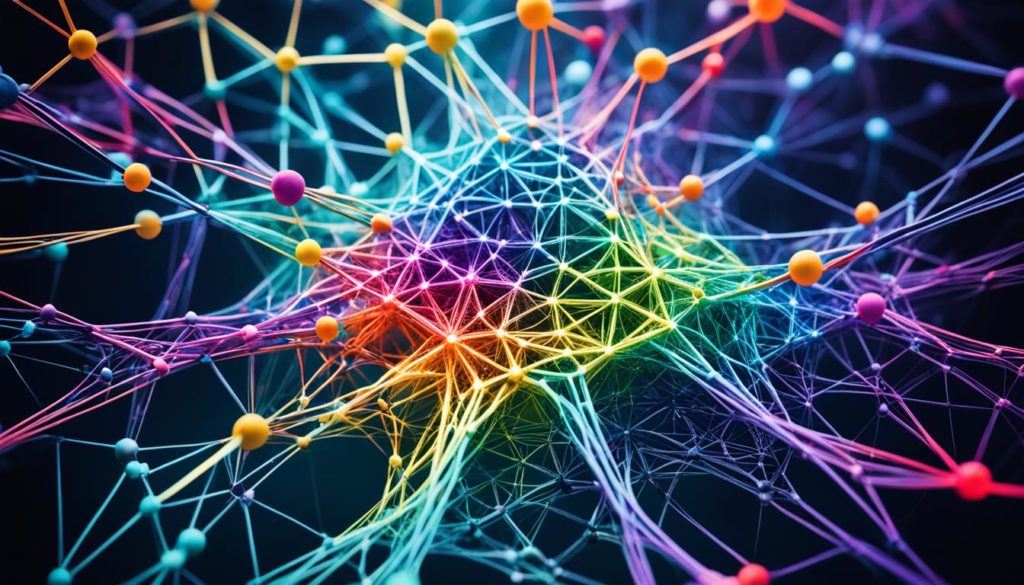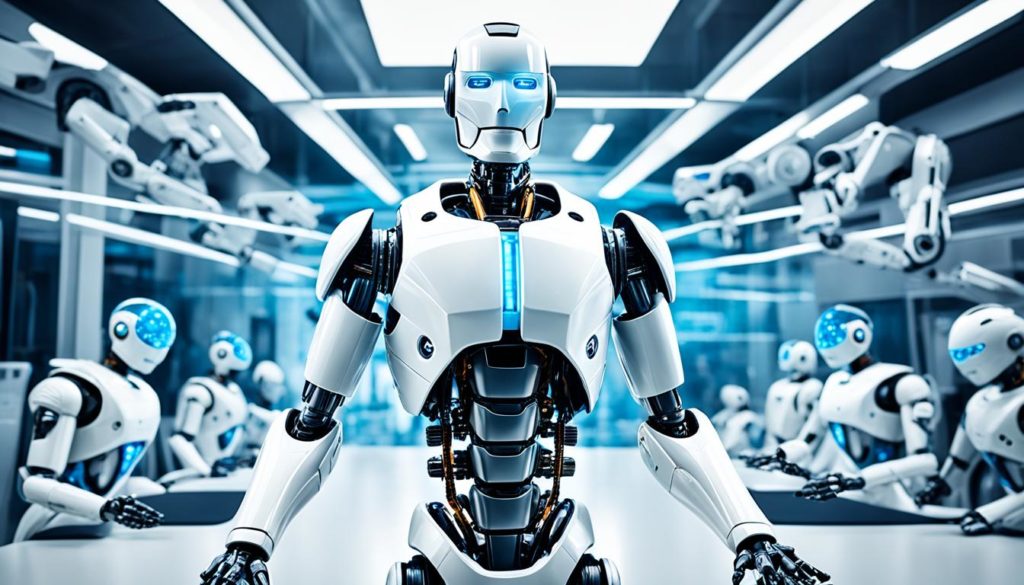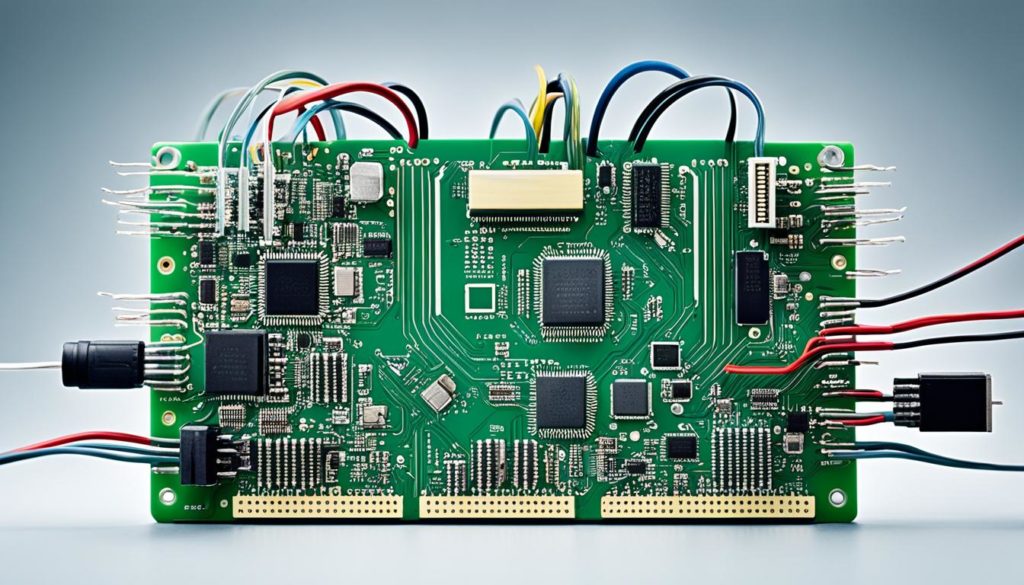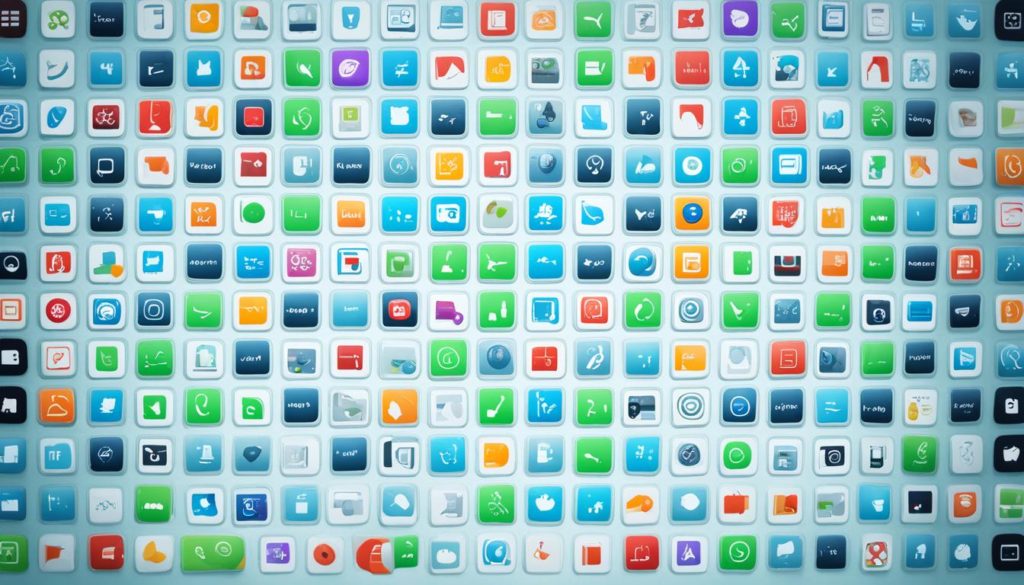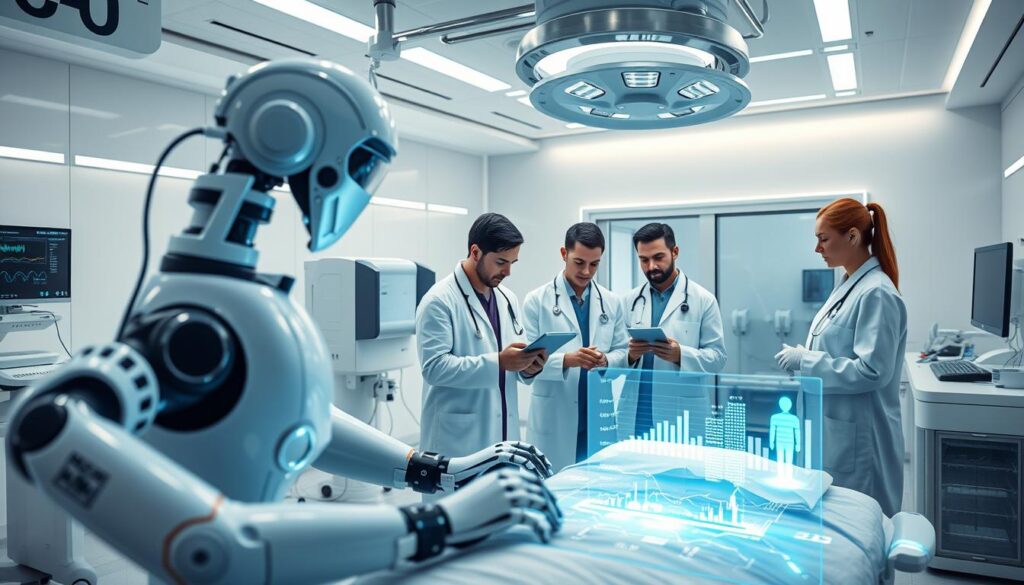
Did you know that by 2030, the gap between supply and demand for staff in NHS trusts could grow to almost 250,000 full-time posts? The world is facing an 18 million shortage in healthcare workers, including 5 million fewer doctors. This shows how urgent the need for new solutions is, and AI in healthcare is leading the way.
AI is changing healthcare in big ways, offering digital solutions that improve patient care and make things run smoother. Thanks to cloud computing, AI can now quickly analyze huge amounts of data. This leads to better diagnostics, personalized treatments, and disease prevention. Let’s explore how AI is changing patient care and the healthcare world.
Key Takeaways
- By 2030, a significant shortfall in healthcare professionals is anticipated, highlighting the urgency for digital healthcare solutions.
- AI-driven innovations are crucial in improving patient outcomes and operational efficiency in healthcare.
- Cloud computing enables effective AI integration by providing the necessary computational power and cost efficiency.
- AI technologies such as supervised learning and deep learning are pivotal in disease detection and diagnostics.
- Human-centered AI approaches ensure that artificial intelligence augments, rather than replaces, human intelligence in healthcare.
The Role of AI in Modern Healthcare
Artificial intelligence (AI) is changing healthcare in big ways. It helps doctors care for patients better and makes things run smoother. AI does things like predict health issues and handle paperwork, making healthcare better.
Improving Patient Outcomes
AI has made a big difference in how well patients do. It helps doctors find problems early and do surgeries more accurately. For example, IBM Watson can spot cancer in images, helping patients get treatment sooner.
AI also helps make treatments just right for each person. Google’s AI can spot over 50 eye problems, helping doctors catch issues early. This helps prevent bigger problems and makes patients recover faster.
To learn more about AI’s role in healthcare, check out this research.
Enhancing Clinical Team Efficiency
AI makes healthcare teams work better by taking over simple tasks. This lets doctors spend more time with patients. AI can handle things like paperwork, saving time and money.
AI helps hospitals plan better too. It predicts when patients will need care and helps with staffing. For example, Massachusetts General Hospital uses AI to find the best cancer treatments, helping doctors make better choices.
Using AI in healthcare makes things run smoother. It helps patients get better care and doctors work more efficiently. This shows how important AI is for a better healthcare system.
AI-Driven Diagnostics and Imaging
In recent years, AI has changed diagnostics and imaging in medicine. This has brought big steps forward in healthcare technology. In 2023, there was a huge spike in articles about AI’s role in medical imaging.
Deep learning algorithms, like multilayer perceptron networks, have made disease diagnosis better and faster. AI can quickly and accurately look at medical images. This helps find diseases early that might be missed by old methods.
AI-driven radiology is a big leap. It automates tasks like image segmentation and annotation. This lets radiologists focus on harder cases. It makes diagnosis faster and more accurate, catching important issues like tumors or kidney problems.
AI in medical imaging also helps with personalized medicine. It looks at patient-specific data to create treatment plans. For example, AI in cardiac imaging can spot changes and patterns. This helps diagnose conditions like coronary artery disease and arrhythmias more accurately.
AI has also improved image-guided interventions and surgeries. It makes surgeries more precise and safer. This leads to better patient outcomes and safer procedures.
To show how AI helps in diagnostics and imaging, here’s a table:
| AI Application | Benefit |
|---|---|
| AI-Driven Radiology | Reduces radiologist workload and improves diagnostic accuracy |
| Cardiac Imaging | Enhances detection of coronary artery disease and arrhythmias |
| Pathology | Improves accuracy in diagnosing diseases like cancer |
| Image-Guided Interventions | Increases surgical precision and reduces procedural risks |
| Personalized Medicine | Generates patient-specific insights for tailored treatments |
AI in medicine, especially in diagnostics and imaging, shows its huge potential. As we keep improving and using these AI tools, patient care and clinical results will keep getting better. This will shape the future of healthcare.
Personalized Treatment Plans and AI
In today’s world, AI is changing how we treat patients. It uses patient data to create unique treatment plans. This makes treatments more effective and safer for everyone.
Tailoring Therapies to Individual Patients
AI helps make personalized medical treatment plans by looking at many factors. It considers genetics and health history. This way, doctors can plan treatments that work best for each patient.
Predictive Analytics in Treatment
Predictive analytics are key in healthcare. They help AI predict how patients will react to treatments. This means doctors can make changes to improve care and results for each patient.
Learn more about AI in healthcare.
The Impact of Machine Learning on Healthcare Analytics
Machine learning in healthcare has changed how we analyze health data. It helps us find patterns and trends that improve patient care and resource use. This technology uses large datasets to predict health outcomes.
AI is changing how doctors diagnose and treat patients. In the UK, an AI system for breast cancer diagnosis cut down on wrong positives and negatives. In South Korea, AI was better at finding breast cancer than doctors.
Machine learning makes diagnosis more accurate and efficient. AI can spot issues in medical images that humans might miss. For breast cancer, AI was 17% more accurate than doctors in early detection.
AI also makes healthcare operations smoother. It handles tasks like scheduling and insurance claims better. During the COVID-19 pandemic, AI helped manage hospital resources.
Supervised learning algorithms like SVM and ANNs are key in disease prediction and image detection. Unsupervised learning, on the other hand, helps find hidden patterns in data.
| AI Diagnostic Tool | Performance Metrics | Application |
|---|---|---|
| AI System for Breast Cancer (UK) | 5.7% reduction in false positives, 9.4% reduction in false negatives | Breast Cancer Diagnosis |
| AI with Convolutional Neural Networks (South Korea) | 90% sensitivity in diagnosing breast cancer | Image-Based Diagnosis |
| AI for Early Breast Cancer Detection | 91% accuracy | Early Detection |
The AI in healthcare market is growing fast, with a 37% CAGR from 2022 to 2030. This growth shows how much healthcare relies on AI for better patient care and efficiency. As AI becomes more common, healthcare will see big improvements.
Adoption and Integration of AI in Healthcare
The journey of AI in healthcare is promising but challenging. It has the power to improve analytics and efficiency. Yet, getting everyone on board has been slow.
Several steps are key to moving forward. AI in healthcare needs careful planning and the support of many. A McKinsey report shows over 70% of U.S. healthcare leaders are using or planning to use AI. The Chinese government also supports AI with plans like the Three-Year Guidance for Internet Plus Artificial Intelligence Plan.
Challenges and Barriers
Healthcare faces unique challenges with AI. Data privacy is a big issue, needing strict rules like HIPAA. Also, different systems make it hard to integrate AI smoothly. High costs and maintenance are also barriers, especially for small facilities.
Another challenge is the quality of data from doctors. Without good data, AI can’t work well. Many providers are hesitant to share data, which is needed for AI to learn. This hesitation leads to incomplete data.
Successful Implementation Strategies
Despite challenges, there are ways to succeed with AI in healthcare. Engaging everyone involved is crucial. Early planning for ethics and data governance helps avoid problems.
Investing in training helps staff understand and accept AI. For example, focusing on big hospitals can speed up adoption. The quality of AI’s learning and data is also key to its success.
Breakdown of AI-Related Job Postings in Healthcare:
| Type of Role | Percentage |
|---|---|
| Clinical | 60% |
| Administrative | 34% |
| Research | 6% |
These steps help healthcare adopt AI effectively. As healthcare evolves, a thoughtful approach will be essential for AI’s benefits.
AI in Healthcare: Ethical and Regulatory Considerations
AI is becoming more common in healthcare, and we must address ethical and regulatory issues. Privacy and security of patient data are major concerns. The General Data Protection Regulation (GDPR) from the EU has set a global standard for protecting personal data.
However, there’s a need for stronger laws to protect health data. This is crucial for ensuring patient privacy and safety.
Ensuring AI is fair and transparent is key in healthcare. AI algorithms must be designed to avoid bias. Transparency is vital for accountability in critical medical situations.
Informed consent is also essential. It involves clear communication between patients and healthcare providers about risks and privacy. This includes discussing genetic information and other important aspects.
The rise of AI has brought up social issues, like job losses and salary decreases. AI, like medical robots in Italy and India, has helped during the COVID-19 pandemic. But it also raises concerns about losing human empathy and care.
It’s important to follow ethical AI principles and develop strict regulations. This will help ensure AI is used fairly, transparently, and safely in healthcare.
FAQ
What is the role of AI in healthcare?
AI is changing healthcare by making care better, improving patient experience, and saving money. It helps with aging populations and a shortage of workers. AI uses predictive analytics and automation to improve treatments and tasks.
How does AI improve patient outcomes?
AI helps patients by making diagnoses more accurate and treatments more personal. It uses predictive analytics to offer timely and effective treatments. This leads to better recovery rates and fewer side effects.
In what ways is AI used to enhance clinical team efficiency?
AI makes teams more efficient by automating tasks and analyzing data. This lets healthcare workers focus on patient care. They can make better decisions, improving healthcare delivery.
How is AI applied in diagnostics and imaging?
AI in diagnostics and imaging makes analysis faster and more accurate. It helps detect conditions like tumors and predict kidney function decline. This reduces the workload for radiologists.
What role does AI play in personalized treatment plans?
AI helps personalize treatments by analyzing patient data. It uses predictive analytics to forecast disease progression. This leads to more effective and safer treatments.
How does machine learning impact healthcare analytics?
Machine learning in healthcare analyzes large datasets to find patterns. It predicts health outcomes and optimizes resource allocation. This makes healthcare providers more efficient in their decision-making.
What challenges and barriers exist in the adoption of AI in healthcare?
Challenges include data privacy, lack of interoperability, and high costs. Addressing these requires engagement, ethical considerations, and training. This ensures AI is integrated successfully in healthcare.
What are some successful strategies for implementing AI in healthcare?
Successful strategies include engaging stakeholders, addressing ethical and privacy issues, and training staff. These steps help overcome resistance and maximize AI’s benefits in patient care and efficiency.
What are the ethical and regulatory considerations for AI in healthcare?
Ethical and regulatory guidelines focus on data privacy, avoiding biases, and transparency. Regulatory frameworks evolve to protect patients while encouraging innovation. This ensures AI is used responsibly in healthcare.
Future App Studios is an award-winning software development & outsourcing company. Our team of experts is ready to craft the solution your company needs.


